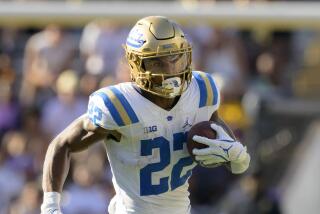Norrie Finds Niche in Broadcast Booth : Radio: Former UCLA quarterback has settled in as color commentator of KMPC broadcasts of Bruin football games.
- Share via
WESTWOOD — David Norrie no longer calls plays for the UCLA football team, but the former Bruin quarterback is making a name for himself with his descriptions and insights about them.
Norrie, who led UCLA to the 1986 Rose Bowl, is in his third season as the color commentator for Bruin radio broadcasts. A novice when he was hired in 1991 by KMPC-710, Norrie has learned and improved quickly. His experience as a player is evident in his analysis. His concise comments, both positive and negative, have earned him recognition as a fair and knowledgeable comer in the broadcasting business.
“If you’re going to criticize or give plaudits, they better be warranted, because if they aren’t, you’re very quickly going to lose credibility,” said Norrie, a native of Portland, Ore. “I think I’m getting credit for being a guy who is not a homer. A guy who is credible.”
Norrie, 29, had many credentials when he was selected as a candidate for the color commentators’ job, but broadcast experience was not one of them.
Norrie had spent five years at UCLA, earned the starter’s job in his final season of eligibility, led the Pacific 10 Conference in passing efficiency and guided the Bruins to the Rose Bowl. He was drafted and cut by the Seattle Seahawks, but was signed by the New York Jets.
Norrie earned a spot on Jet roster out of training camp and played during the 1987 NFL players’ strike. He was offered a contract for the 1988 season, but chose instead to pursue a career in commercial real estate.
“At that point, I had to take a hard look at whether I was going to be a starter or a solid backup,” Norrie said. “I just decided it was time to get on with my life.
“Almost everyone I talked to said, ‘You’re young, stick it out and keep going.’ I just didn’t think that was right for David Norrie at the time. And the way things have worked out for me, I have no regrets.”
Like many former UCLA players, Norrie was helping out as an instructor at Coach Terry Donahue’s football camp when the color commentator job opened. Norrie was persuaded to interview for the position by Donahue, UCLA Athletic Director Peter Dalis and former Bruin quarterback Rick Neuheisel, who had joined the UCLA coaching staff.
Norrie said the interview went well, but that his selection for the job was dependent on his willingness to attend a sportscaster’s camp. He readily agreed and spent a week listening to presentations by camp speakers such as Bob Costas, Chick Hearn, Roy Firestone and Bob Miller. He also did play-by-play of professional summer league basketball, Angel baseball and a replay of a USC-UCLA football game.
Each night of the camp, Norrie had his tapes reviewed by staff members.
“(Kings announcer) Miller worked with me very intensely,” Norrie said. “He reviewed the tapes and gave me a lot of pointers. That week of camp assuaged a great deal of fear on the station’s part.”
Norrie sounded comfortable from the outset despite his inexperience. His weekly preparation and familiarity with the way UCLA coaches thought out and instructed their players to execute game plans was evident and continues to be one of his strengths.
“He’s a perfectionist,” said Chris Roberts, who does play-by-play for UCLA football and basketball. “He knows what Terry Donahue and (offensive coordinator) Homer Smith are thinking. I think he has close to a photographic memory.”
Norrie admires the work of Pat Haden and Tim McCarver, two former athletes who are recognized as among the best color commentators. Although commercial real estate is his main source of income, he hopes his work on UCLA broadcasts will open opportunities in broadcasting.
“When I go home from a game and listen to the (tape of) the broadcast, I’m cringing a lot. The average listener might think something sounded fine, but to me, some things don’t sound fine.
“I know I have a lot to learn and can improve every aspect of my work. That’s part of the challenge. That’s part of the fun.”
More to Read
Go beyond the scoreboard
Get the latest on L.A.'s teams in the daily Sports Report newsletter.
You may occasionally receive promotional content from the Los Angeles Times.







